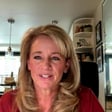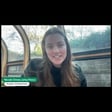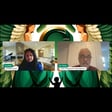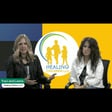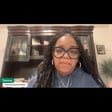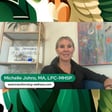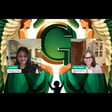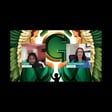Become a Creator today!Start creating today - Share your story with the world!
Start for free
00:00:00
00:00:01

Season Two/Episode Fifteen (Finale): When the World Feels Scary - Helping Kids With Disturbing News
How do you explain war to a 10-year-old? What do you say when your child asks about tragic accidents they've heard about? In our hyper-connected world, children are exposed to disturbing news whether we plan for it or not, and dismissing their concerns with "don't worry about it" isn't enough.
In this episode, family therapist Cory Reid-Vanas (MA, LMFT) from Rocky Mountain Counseling Collective shares practical, age-appropriate strategies for navigating these challenging conversations. We explore how children at different developmental stages process difficult information, why validating their feelings is crucial, and what it truly means to "show up" for kids during uncertain times.
Transcript
Introduction and Mission
00:00:00
Speaker
Welcome to the Guardians of Hope podcast, where we bring together parents, nonprofits, legal and medical experts dedicated to positively impacting children's lives. I'm your host, Cynthia Ramsaran. The thoughts and opinions of my guests are not necessarily my own.
00:00:15
Speaker
So thank you all for joining and sharing. right Welcome, everyone.
Discussing Disturbing Events with Children
00:00:19
Speaker
One of the most challenging aspects of parenting and caring for my child recently has been figuring out how to talk to him about the disturbing events he's inevitably exposed to through the news, social media, and conversations around him.
00:00:34
Speaker
Whether it's ongoing conflicts abroad, tragic events or accidents closer to home, or other headlines, children are processing these events in ways we may not even realize.
00:00:47
Speaker
They're forming questions, fears, and understanding that can deeply impact their sense of safety.
Insights from Corey Reed Banas on Trauma Processing
00:00:53
Speaker
Today, I'm joined by Corey Reed Banas, clinical therapist and founder of Rocky Mountain Counseling Collective.
00:01:01
Speaker
Corey brings professional expertise in family therapy and a deep understanding of how children process trauma and difficult information. Corey, thank you so much for joining me today.
00:01:14
Speaker
Thanks, cindia Cynthia. I'm grateful to be here and appreciate the opportunity. Of course. So why don't you start by telling us a little bit about your background and your experience?
00:01:25
Speaker
Yeah, absolutely. um So my background, I've been working with kids, children and teenagers and families for um over 20 years. And the last 12 years I've been running Rocky Mountain Counseling Collective, which is a group mental health practice in Denver, Colorado. And we I serve primarily the Denver metro area, and um we have clients from all around the state, but primarily kind of the Denver metro area.
Corey's Experience and Mental Health Practice
00:01:56
Speaker
I have experience. kind of starting out as an athletic coach to supporting mentors to wilderness therapy, outdoor leadership, and then um for the last 12 years being a therapist at Rocky Mountain Counseling Collective. So yeah, thanks for having me today. of course. Yeah. Thank you for ah sharing that with us,
Influence of Media on Young Children
00:02:21
Speaker
Corey.
00:02:21
Speaker
Now I want to start with the basics about children and the age they typically begin to absorb and process information, particularly around disturbing events, even if we think we may be shielding them.
00:02:37
Speaker
Yeah. Yeah, I think, you know, just to start, this is a really important topic, especially in this day and age with the amount of access we have to information, right? And so assuming that our our kids, our children are not accessing, I think is a wrong assumption.
00:02:57
Speaker
i think we need to um understand that they're they're accessing this information and how do we kind of developmentally understand what happens to them or what's going on when they do have access to information of things going on around them, right, in their community, in the in the world at large. And so,
00:03:19
Speaker
um you know what what essentially we're talking about is developmental awareness and so we can start by saying you know kids children babies age zero to say three are really influenced by their parent their caregiver the environment that they're existing in right and so um their level of emotional um in-tuneness is high right and so if their caregiver or parent is upset or if the environment around them is
00:03:58
Speaker
calm or chaotic, like they are directly impacted by that. Right. And then as kids kind of transition from being babies to becoming toddlers, I think one of the things that we understand is how much information they are paying attention to, right? They're listening, they're watching.
00:04:19
Speaker
And so, you know kind of expanding on what we were talking about, you know, the nonverbals that babies are picking up, toddlers in, you know, three plus years of age and higher are also picking up on, but they're starting to really things, right? And whether they can fully understand it or process it, they're hearing things and also in combination of the nonverbal information that they're taking in. And so,
00:04:46
Speaker
I think really the the thing to highlight in this moment is is that as soon as you know that person is in this world, they are taking
Balancing Honesty and Security in Conversations
00:04:56
Speaker
in information. So from you know the day they're born, I think it's important for parents and adults and caregivers to understand that our kids are taking it in information and we need to thoughtfully and intentionally try to think about how to you know, support them around kind of the the information that they're going to be exposed to for the better and, and you know, potentially, um you know, challenging or complex things that they might see in the world.
00:05:28
Speaker
stop Absolutely. Now, how do we balance being honest with them, with our children while preserving their sense of safety and security?
00:05:40
Speaker
yeah I mean, I think you outlined it perfectly, Cynthia, right? There's the balance is between honesty and safety. And one of the things that I like about the idea of balance is it's rarely exactly like this, right? And so we're kind of trying to you know be honest and make sure that we're ah reassuring our children that they are safe, right?
00:06:09
Speaker
And so i think we'll talk more about it in this conversation of specific, you know, ages and kind of developmental approaches around how honest we are, how transparent we're being, right, and how much we're kind of focusing on the safety of things, right?
00:06:28
Speaker
i think an important piece to highlight is two things. First is is the specific kid, right? So I think about how unique and individual every single kid is. And as a parent, caregiver, and adult in a young person's life, we want to try to cultivate our response based on our understanding of that specific kid.
00:06:54
Speaker
Okay. And even broader than that, or zoomed out from that, I think about, you know, kind of honoring the the family that that kid is member of, right? And so the piece that as a ah therapist that i work really hard to kind of understand is the culture of that family.
00:07:16
Speaker
and the way that i've learned to understand the culture of someone's family is through their values and some of the work we do as therapists is helping kids families individuals understand what their values are that could be a whole separate podcast you know that but i think those are really important components um i've been thinking about how we're going to navigate this this particular topic, which is, you know, when information is accessed and how do we support a young person in digesting that and working through it depending on who they are, the family that they exist in, and and developmental appropriateness.
00:08:01
Speaker
okay And Corey, you touched upon this a little bit, but this leads me into the next question about walking us through these conversations and how they differ based on age groups, say elementary school, middle school, and then teenagers.
00:08:18
Speaker
how Can you give us some examples of how to um appropriately speak to our children about these topics?
Approaches for Preschoolers
00:08:25
Speaker
Yeah, I have some notes here because I think that there's you know really integral, important pieces of information to try to share with your listeners that um you know we want to we want to highlight. right Yeah, for it. What I would say is like you know for preschool age kids, yeah know we really want to think about kind of the leaning like more towards like the emotional aspect of it all, right of like paying attention to
00:08:55
Speaker
our own emotional experience, right? Related to what's happening in the world at large around us, um because that's what they're in tune with, right? And is indirectly impacted by, right?
00:09:08
Speaker
And I think specifically, if we're, you know, draw on some, wisdoms from play therapy, right? We think about young people processing through play, right? So play is not just play for kids. It's how they understand the world around them, how they process their emotions. And so, you know, we can utilize that. You don't have to be a trained play therapist to utilize play in supporting young person, age, let's say, zero to three or four in processing their emotions and understanding the world around them.
00:09:47
Speaker
Right. It could be as simple as navigating social relationships. Right. And I know in the context of this conversation, we're talking about, you know, being exposed or having access to information.
Discussing News Events with Young Children
00:10:01
Speaker
Right.
00:10:01
Speaker
um you know, a quick example of that is my four and a half year old daughter last night happened to see on the news an airplane um dropping ah fire retardant on a fire that's happening. And she was asking questions about what that was. And as I was preparing for this, our conversation today, I was like, oh, I get to use some of the things that I've been thinking about. And ah luckily I was, you know, had that as kind of the um front of my mind, which we don't always have, right? And we can talk about that further. But I think, you know, thinking of, again, like kind of having some of that developmental understanding can help us in being prepared for these conversations. So moving, kind of moving on to like, say, let's say early elementary, you know, age five to eight, right? So we think about, know,
00:10:54
Speaker
using very simple concrete language, right? And concrete language is specific, right? So instead of saying fruit or produce, right, we're gonna say, you know, a very specific type of apple, right? And that we eat it for breakfast or we eat it for lunch, right? And so we wanna be, know,
00:11:13
Speaker
simple but very specific in the language that we're using, right? And similar to what we were talking about, if like we think about kind of like this this young person growing up, right? We're going to always validate the emotion, the feeling that they're experiencing.
00:11:31
Speaker
We're going to listen. We're going to ask questions. um And as the as the parent or caregiver, We always have to remember to take a deep breath because what could be happening could also be upsetting to us.
00:11:46
Speaker
And we need to remember that our kids can sense that. They can feel when we are upset or dysregulated. And so anything we can do to help bring ourselves down is worth it, right, for ourselves, but also our kids are going experience that, right, in that specific conversation. Also, just to role model that a you know an important part of our well-being. so um For you know that age group, you know I think play is also a great strategy in terms of talking things through books. right You're starting to read a lot of books to kids at that age.
00:12:25
Speaker
So accessing different resources for from the library, depending on what it is that's happening or has happened, right utilizing books and stories. right So thinking about how that you know that age range really starts to like to to absorb information, right? And so that those kids are really into books and stories and and play.
00:12:50
Speaker
And then reassuring safety, right? Remembering kind of that balance of being honest, but also reassuring safety. and so um a great quote i think uh i think it's always nice to have some things to say right and to uh you know adjust them according to to your style right but a ah great quote is uh you know sometimes sad things happen in the world and when they do adults work together to help and keep children safe and so some inspiration of that of saying that like
00:13:23
Speaker
yes these you know sad or hard or scary things do happen and there are adults in the world that are working really hard to keep things safe right and specifically in your world it's you know me as your parent or caregiver it's your teachers it's your community members that are working hard to to keep your world safe, right? So really ensuring that.
Engaging Older Children in World Events
00:13:49
Speaker
um And then and we kind of move on to the middle school years, like nine to 12. And that's where I think we can start to really um you know, engage in a little bit more dialogue, right? right Again, asking lots of open-ended questions, right? So open-ended questions, the quick version of that is like not yes or no questions, right? Of like, tell me what you think about that, or how did that impact you?
00:14:15
Speaker
Or like, that sounds like, you know, that sounded scary. Was that scary for you? That's not an open-ended question, but um thinking about trying to, you know,
00:14:27
Speaker
cultivate answers from them versus, um you know, feeding them kind of yes or no questions. So, um and I think, you know, acknowledging kind of the complexity of of whatever has happened is is worthwhile, right? Is helping them start to, you know, recognize like that lots of these, you know,
00:14:49
Speaker
things that happen in the world are complex, right? And they're starting their brains are starting to be able to understand some of these complexities. So, ah yeah, and so, you know, I think that the,
00:15:05
Speaker
One of the pieces I think about at this age is like connecting it to community right and the impact that has on them individually, but also say like their fellow classmates and their friends and the community that they're part of, right because they're starting to you know really engage in that part of things kind of outside of their direct family, you know, working and navigating through their community. So a good example for Script is this is a complicated situation where people disagree about important things.
00:15:40
Speaker
Let's talk about what you're hearing and how you're feeling. um And so then quick, we can kind of move on to like kind of age 13 plus. right you know Again, we're increasing um the complexity of young people's ability to like understand the complexity of these situations. right As always, kind of as I've said, right we want to lead with and the emotional part of it, of like not acknowledging the feelings first, right understanding kind of the information that they've accessed and how it's impacted them.
00:16:18
Speaker
and you know giving some space for like the the emotional component of of what's happening in that moment. So um yeah, and I think this is where we kind of start to think about like critical thinking and who you know supporting young people in what we call media literacy. right And so there's a lot to that. There's you know the boundaries of of what you access and how you access it.
00:16:45
Speaker
Right. And then there's also like understanding how to determine if the information is accurate or inaccurate. Right. So beginning to teach young people about that.
00:16:56
Speaker
And there's all sorts of different directions we could go with that in terms of how we role model that as the adults in their lives. But again, these are some of like the basic. hey ideas that I think is important for adults to be thinking about. Right.
Encouraging Teen Engagement and Critical Thinking
00:17:12
Speaker
um And then i think especially at this age, this is a really cool time to think about action opportunities. So volunteering advocacy donations. Right.
00:17:24
Speaker
We hear some really inspiring stories about young people responding to really difficult things that happen around the world in advocacy of of you know people that have gone through something really difficult. And so those are always you know uplifting to see. So.
00:17:42
Speaker
one Absolutely. And you know I think these are times where young people start to express opinions that could be different or difficult ah to hear.
00:17:55
Speaker
and I think you know it's an opportunity to to to listen, to sure challenge, but also to like you know lead with kind of that listening and kind of more open open-ended questions versus like immediately challenging them if they say something that you disagree with or dislike.
00:18:16
Speaker
you know It's like giving them an opportunity to think through and work through some of their ideas or opinions about things I think is is really important.
00:18:28
Speaker
And so some good examples for things that you could say are, what are your thoughts about this situation? um How do you think we should respond as a family or as a community?
00:18:39
Speaker
right um And then, you know i think we kind of talked about this earlier, right but it's like the developmental information is it really helpful to have, right but that's you don't want to just stop there. right You want to apply that information to your specific kid.
00:18:57
Speaker
Right. So we know, right, some kids maybe are more in tune with their emotions and maybe kids are more intellectual. And so um I always think about how can we respond holistically, but maybe lead with what you know they are more familiar with or comfortable with in terms of processing you know information or or something that they're navigating.
00:19:23
Speaker
um I think that that's probably a good kind of, you know, overarching coverage of some of the development. It was excellent. Really helpful, Corey, especially breaking it down by age group and helping us understand certain words or phrases to use in certain approaches like play versus asking open ended questions. I think that was incredibly helpful. So thank you. Yeah.
00:19:49
Speaker
I'm going to move on to what we should look
Identifying Signs Children Need Support
00:19:52
Speaker
for now. So now that we've had these conversations or now that we are aware that our kids have some sense um of what's happening that may affect them, what are some of the red flags that parents should watch for that might indicate your child is struggling with something that they've heard or that they've seen? Mm-hmm.
00:20:15
Speaker
Yeah, I think this is a this is a good question, right? And it goes back to some of that you know individualized nature of all of this, right? And so as the adults, as parents, caregivers, right we're paying close attention to to the kids that we're focused on. right and so Any change in behavior, um but the reality is is there's change in behavior because there's a lot of growth and change that is happening for these young people.
00:20:46
Speaker
But I would say anything kind of significant that you're noticing that's lasting for you know more than two to three weeks. right um And if they're, you know, dysregulated or not seeming to be coping in of what quote unquote normal ways that they do, um right? Any shift in that I think is an opportunity to check in with them, to think about, you know, do they need additional support to work through this, right? And so the the kind of minimum is a check-in, right? It's like kind of thinking about, know,
00:21:26
Speaker
you know oh do i need to kind of sit down with my kid or find a moment to you know connect with my kid whether it's driving or you know sitting down kind of when there's a quiet moment to to have some conversations there so um yeah so i think you know some of the things to highlight around behavioral changes that are nuanced is like sleep patterns right how they're um you know eating right how they're like you know doing self-care, like you know showering, brushing their teeth, like you know some of those basic things that if there's a shift in some of that, um probably good to kind of just like keep on your radar and think about, like are they stressed? Are they struggling? Are they you know going in and they need some opportunity to kind of talk through you know things that are happening kind of in the world around them? so
00:22:19
Speaker
And again, like it's it's so age dependent. Right. And so like thinking about ah younger kids, if there's any type of stuff like regression related, right, like bedwetting or kind of inconsolable emotionally. Right. That outside of kind of the ordinary. right that you might um you know have some concerns so um yeah and think any kind of like uh social withdrawal um school performance or kind of attention related concerns um and i think you know for kids that are you know that go inward it's of concern and then kids that are kind of you know
00:22:58
Speaker
their behaviors are out of control, right? Or they're um constantly expressing worry or anxiety, right? We want to look for those, you know, kind of differences and and try to respond, you know, accordingly.
00:23:12
Speaker
So. Yeah, like attachment issues, if you've seen ah difference in the way that they are when you leave the house for work or something like that, that's something that I've noticed. Yeah.
00:23:23
Speaker
Yeah, I think attachment frameworks are really important to try to understand too as as parents, caregivers, adults in the lives of young people, right? We have access to a lot of information related to kind of the psychology of human beings, right?
00:23:41
Speaker
And attachment is one of those that I think is is really helpful. And if, to your point, right, if there's a difference in kind of what you know about your kiddo's attachment style or kind of,
00:23:52
Speaker
natural way, right? There's an opportunity to kind of like, oh, something's going on here. Like, what do we need to do? Right. could as simple as conversation and spending time with them.
00:24:04
Speaker
Right. It could be more, um you know, higher level response, like thinking about, you know, additional support, right? Like working with a therapist or something like that.
00:24:15
Speaker
Right. So, and I always think about like, you know, kind of this idea of like proactive versus reactive. Right.
Anticipating Children's Needs and Open Communication
00:24:22
Speaker
And yes, it's ideal to kind of proactively think about what your kid needs.
00:24:28
Speaker
Um, but that's, you know, the reality is, is that we can't always anticipate. that so um sometimes we're in a position of kind of reacting something has happened and we need to you know rally the troops and get some supports in place and um you know empower you know support our kid through kind of this particular moment so yeah great when we can be proactive and kind of intentional of okay we need to do this for our kiddo because this is happening or this is coming right this transition this change like we're you know a lot of us right now are moving from
00:25:02
Speaker
you know summer programming to back to school. Right. Yeah. proactively, what can we do to support our young people in that transition? Right. And so some of what's happening in this conversation is is like when kids access information, they're transitioning from one reality to a new reality of understanding maybe some more complex things that are happening that happen in the world. And so um supporting them and powering them through that transition is it's worthwhile.
00:25:34
Speaker
here Thank you, Corey. So on the note of being proactive, my next question for you is what's your advice for parents who realize their child has been already exposed to something or some disturbing information or news story before they've had a chance to be proactive and talk to them about it?
00:25:55
Speaker
Yeah. Yeah, it's it's in some ways um simple in in theory, but maybe more... challenging it in in action, which is is the communication piece, right? Is to to talk to them about it, to use some of the um frameworks that we've talked about today, right? of Thinking about, okay, like they have been exposed to this piece of information that um I didn't either want them to be exposed to, I'm not sure that they're ready for, or I know that they're not ready for.
00:26:31
Speaker
What we know is we have honest conversations with our kids, builds trust, right? And when kids feel trust, they also build resiliency in line with that, right? And so um having those,
00:26:49
Speaker
open, honest conversations with them, reassuring safety, right? um And making sure that we're thinking about it kind of in the context of like what's appropriate um based on their, you know, their developmental age, but also their individual uniqueness, right?
00:27:06
Speaker
And so does that answer your question? I think that's, Yeah, I think so. And I think you did cover that a lot in in the steps that you know, to address things, whether we know that they have heard about it without appropriately um discussing it with them proactively. I think that we are now armed with some of the approaches and that the steps to take to talk to our kids. So thanks for that.
00:27:31
Speaker
If I can, i would say, like, i think it's for all, you know, people that are supporting young people, like, think you have to remember that there's no way to perfectly protect them, right, from all of the things
Equipping Children for a Complex World
00:27:47
Speaker
in the world. And like, we want to protect them.
00:27:50
Speaker
And the way that we really do it is by giving them the tools to be able to navigate through the imperfect world that we live in. Right.
00:28:01
Speaker
And remembering that really there there is safety. Right. And that they, you know, whether it's kind of internal or kind of within your family system or the larger community,
00:28:13
Speaker
right That part of what we're trying to do is to give them the the tools and the skills to be able to navigate through you know the the complex world that we exist in.
00:28:26
Speaker
And I think it comes, like you said, it's not just about parents, it's anyone who is out there to support kids, teachers, therapists, advocates, ah attorneys, whatever whatever capacity you play in a child's role.
Importance of Parental Self-Care
00:28:41
Speaker
But I think that us as humans, we also carry that overwhelmed feeling at times when processing these horrific stories that are in the news right now.
00:28:53
Speaker
um I'm just wondering if there's any advice you have for us, for parents, for people for adults, um on how to manage our own emotional ah reaction to these stories while caring and keeping our children's best interests at heart.
00:29:11
Speaker
Yeah. One of the, I think, easiest examples that I think a lot of people can relate to, and this is used a lot in the mental health world specific to parenting, is you know when you're on an airplane and they are going through the safety ah protocols, right? And they say, they they literally come to all the parents and say, like, put the oxygen mask on first and then put on your your kid's oxygen mask, right? And so always think about this idea of like starting with self-care and you know the the parent the the caregivers emotional well-being first right and so it's not well it role models to the young person but it also helps that individual parent caregiver to be able to show up as best they can right and
00:30:03
Speaker
the The reality is is that there's we all have a lot going on, right? And so we don't always show up perfectly for for our kids. And so that's okay, right? We don't have to be perfect in all of this.
00:30:17
Speaker
It's about remembering as best we can to take good care of ourselves so ideally we can show up well. And then when we don't, that we you know we come back to our kids and we say hey like i want to revisit that right i think there's some things i want to say differently um i have some other questions for you right it's an opportunity kind of show that um that we don't have to be perfect in all of this but the foundation is is our own emotional regulation right our own ability to
00:30:50
Speaker
navigate as grounded as possible to support our kids in in working through these hard moments. who Yeah, Corey, that is so important. This conversation has been so helpful for me. i know that I've been struggling a little bit at times.
Setting Boundaries for Emotional Well-being
00:31:06
Speaker
um I haven't been reading the newspaper as much lately because I feel like it has been affecting me. um So thank you for sharing your advice and um you know all the things that you've um been working with your patients and your families with, with my audience.
00:31:23
Speaker
I appreciate it very much. And I'm curious, how can people get in contact with you or learn more about Rocky Mountain Counseling? Yeah.
00:31:35
Speaker
Thanks again, Cynthia. it's We were talking about this earlier, like this is an important topic. And i think the point that you just made is a really important one, which is kind of an additional point is you know, our own boundaries and, you know, managing of information.
00:31:52
Speaker
right, for ourselves and, you know, to role model to young people. So, yeah, so Rocky Mountain Counseling Collective, we're in the, you know, the Denver metro area.
Resources and Support Information
00:32:03
Speaker
We have a website, which is rmcchealth.com. um You're welcome to reach out. Obviously, if you're in Colorado, we could be of direct support.
00:32:16
Speaker
Some of our therapists actually have licenses outside of Colorado, ah but happy to connect. right you know Feel free to send a message you know through our website.
00:32:28
Speaker
many conversations with folks that don't become our clients and we talk about resources and pointing them in the right direction. And so we're happy to do that. Right. It's I think an important part of advocating for you know people just getting connected to the right resources, right resource versus just any. And if we're a resource, great. And if not, we'd be happy to brainstorm and point folks in the right direction.
00:32:56
Speaker
okay Thank you. All right, Corey, it was great to meet you and talk to you Thanks again for your time. Okay. Bye, Cynthia. Thank you. I appreciate it.
